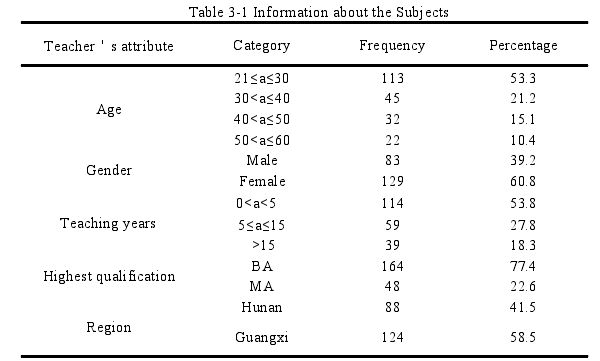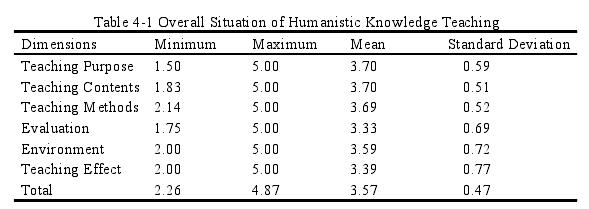本文是一篇英语论文,本文调查结果如下:(1)研究结果表明,高中英语教师人文知识教学的现状处于中等水平。教师问卷六个维度的平均分超过3分,但仍不超过4分,这表明人文教学还有很大的改进空间。人文知识的评价方法和教学效果最低。评价方法均值为3.33,教学效果均值为3。39.这表明高中英语教师对人文知识教学的评价方法重视不够,导致教学效果不佳。
Chapter 1 Introduction
1.1 Background of the Research
Under the pressure of exam-oriented education and college entranceexaminations, high school English teachers often only pay attention to the cultivationof students’ listening, speaking, reading and writing skill. They always take learningscores as center causing students’ lack of humanistic knowledge and resulting in weakcomprehensive ability.
Liu Runqing ( 2015 ) pointed out that English is a humanities subject, andhumanities education cannot be overemphasized. Language teaching and humanitiesknowledge are complementary and inseparable. In high school English teaching,teachers should integrate humanities knowledge into English teaching, which enablestudents to accumulate knowledge of literature, religion, history, art, law andphilosophy in English classes. It can not only broaden students’ horizons, but alsoimprove students’ comprehensive quality and promote students’ all-rounddevelopment.
New Curriculum Standard emphasizes the comprehensive training of students’language ability, cultural awareness, thinking quality and learning ability. Culturalawareness mainly refers to acquiring cultural knowledge. According to NewCurriculum Standard (2017), cultural knowledge refers to: Excellent Humanities andscientific knowledge at home and abroad. Therefore, humanistic knowledge is a partof cultural knowledge. In this paper, the author will make a research on Englishteachers about humanistic knowledge teaching.
1.2 Purpose and Significance of the Research
Based on previous study, the author uses the quantitative method such asquestionnaire and qualitative method such as interview to research on humanisticknowledge teaching of senior high school English teachers.
This research has theoretical and practical significance. In terms of thetheoretical significance, Chinese scholars mainly focus on the study of college. Thereare few researches on the teaching of humanities knowledge of high school Englishteachers, and few researches on the demographic differences of English teachers inhumanistic knowledge teaching. The research on the demographic differences inhumanistic knowledge teaching of senior high school English teachers makes up forthe weakness of relevant research on this issue and enriches the research content inthe current situation of humanistic knowledge teaching. This study provides atheoretical significance to the further study of the teaching of humanistic knowledge.
In terms of the practical significance, The Senior High School English NewCurriculum Standard points out that English is the unity of humanity andinstrumentality. High school English teachers should pay attention to the teaching ofhumanistic knowledge in the teaching process, and guide students to pay attention tohumanistic knowledge. This study can arouse teachers’ awareness of humanisticknowledge teaching and also gives some advice which can promote the teachingability of high school English teachers in humanistic knowledge.
Chapter 2 Literature Review
2.1 Relevant Definition
2.1.1 Definition of Humanistic Quality
Different scholars have different definition on humanistic quality. Du Shizhong(1999) states that humanistic quality involves how the human beings deals with therelationship among the nature, the society, other people’ relations as well as their ownideal, emotion, will and other social attribute aspect. Xu Jie (2004) points out thathumanistic quality, from its connotation, contains the humanities knowledge qualityand the humanities spirit quality. Zhou li (2004) considers humanistic quality is thebasic accomplishment of being a person. It is a comprehensive manifestation ofpeople’s acquisition of humanistic knowledge and formation of humanistic knowledgestructure, and a comprehensive embodiment of the behavioral ability of relatedhumanistic knowledge in practice. In a word, humanistic knowledge can beinternalized into students’ humanistic quality, thus promoting students’ all-rounddevelopment.
Liu Weihua (2005) thinks that humanistic quality mainly refers to the unity ofhumanistic knowledge, social ability and humanistic spirit. It is more related to thesocial and artistic fields.
The core connotation of humanistic quality is humanistic knowledge, humanisticspirit and interpersonal skills. Among the three, humanistic knowledge is the basis forthe formation of humanistic quality, and the improvement of humanistic quality isinseparable from the accumulation of humanistic knowledge. Humanistic spirit is the core of humanistic quality, and the improvement of humanistic spirit depends on theinternalization and integration of humanistic knowledge (Xiao Zhenyu ,2011).
2.2 Theoretical Foundation of the Present Research
2.2.1 Humanistic Education theory
Rogers (1952) applied his humanistic theory to education and formed his uniqueview of education purpose, student view, teaching view and teacher view. Rogersproposed to cultivate people with all-round development. He pays attention to thefulfillment of personal potential and the complete development of people, aiming tomake people “fully perform their functions”.
Humanistic education is based on Maslow’s hierarchy of needs theory, takingself-realization as the highest pursuit of human beings. It is necessary to fully developand utilize students’ abilities, talents, and potentials, so that students can realize their aspirations on the basis of their own growth and development (Wang Yufei, 2012).
Human needs are divided into five levels from low to high like a ladder:Psychological needs, safety needs, social needs, respect needs and self-realizationneeds. Maslow believes that the most ideal person is a “self-actualizing person”.Self-actualization may be roughly described as making full use of and developingtalents, abilities, potentials, and so on. The premise of self-realization must have acomfortable environment (Maslow 1943). In teaching, teachers should strive to createa comfortable and harmonious learning atmosphere for students’ learning. Teachersmust meet the needs of students’ self-realization. The need for self-realization is thatpeople desire to realize their potential. The development of students’ potential isinseparable from teachers’ teaching purpose, content, methods, evaluation, andteaching environment.

Chapter 3 Research Design.................................. 13
3.1 Research Questions................................................ 13
3.2 Research Subjects.....................................................13
Chapter 4 Results and Discussion...............................17
4.1 Overall Situation of Humanistic Knowledge Teaching of English Teachers inSenior High Schools.................................17
4.1.1 Teaching Purpose............................18
4.1.2 Teaching contents........................................ 20
Chapter 5 Conclusion..................................41
5.1Major Findings.......................................41
5.2 Implications.............................................42
Chapter 4 Results and Discussion
4.1 Overall Situation of Humanistic Knowledge Teaching of Senior High schoolEnglish Teachers
The first research question of this paper is to find out the overall situation ofhumanistic knowledge teaching of senior high school English teachers. The situationrefers to teaching purpose about humanistic knowledge, teaching contents, teachingmethods, evaluation methods, humanistic environment and teaching effect. Therefore,the author will analyze the overall situation from these six dimensions. Thedescriptive statistics are as follow:

As shown in Table 4-1, an overall situation of humanistic knowledge teaching ofsenior high school English teachers is presented. The mean of teaching purpose andteaching contents are the highest two (M=3.70). It means that high school Englishteachers are aware of teaching humanistic knowledge not only for improving studentslearning scores, but also promoting the overall development of students. By theguidance of teaching purpose, teaching contents also reach a relatively high level in inthis study. The second is teaching methods (M=3.69), which followed by the humanistic environment (M=3.59).The teaching effect is 3.39 and evaluation methodsis 3.33. Of the six dimensions, the mean of evaluation methods is the lowest one(M=3.33).
Chapter 5 Conclusion
5.1Major Findings
The findings of the investigations are as follows:
( 1 ) The results of the study show that the current situation of humanitiesknowledge teaching for high school English teachers is in a moderate level. The meanscores of six dimensions of the teacher’s questionnaire exceed 3 points but still do notexceed 4 points, which shows that there is much room to improve for humanisticteaching. The evaluation methods and teaching effect of humanities knowledge is thelowest. The mean of evaluation methods is 3.33, and the mean of teaching effect is3.39. This shows that high school English teachers are not pay enough attention to theevaluation methods about humanistic knowledge teaching, which leads to poorteaching effect. In addition, in terms of teaching purpose, most teachers believe thatthe teaching of humanities knowledge is to broaden students’ horizons, which showsthat English teachers can realize the importance of promoting the overall developmentof students. In terms of teaching content, most English teachers are more likely toexplain literature, religion, history, art knowledge in class, which shows that there ismore humanistic knowledge about literature, religion, history, art in textbooks and theknowledge of philosophy and law is more specialized. In terms of teaching methods,teachers use a variety of teaching methods in the teaching of humanistic knowledge,not limited to the traditional teaching method. In evaluation methods, English teachershave not yet found an appropriate method to evaluate students’ humanistic knowledgemastery. As for humanistic environment, most English teachers satisfied with it. Interms of teaching effect, the mean of it is relatively low, which is still need to beimproved.
(2)As for gender differences, male teachers are higher than female teachers infour aspects: teaching contents, teaching methods, teaching evaluation, and teachingeffects. Male and female teachers have no obvious tendency in teaching purpose andhumanistic environment.
reference(omitted)
